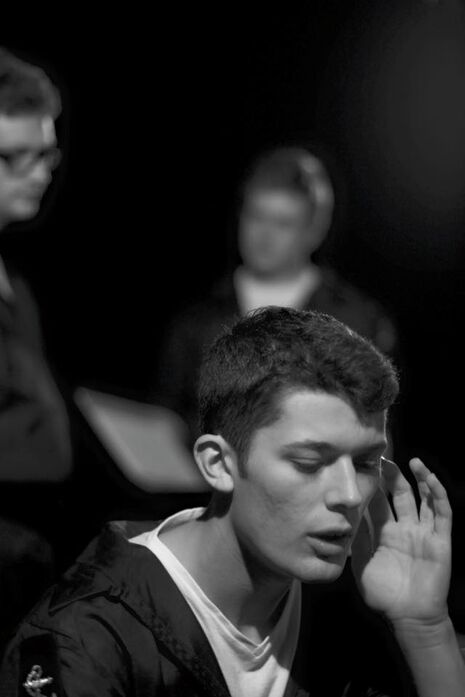Preview: Launch
Sarah-Jane Tollan speaks with the cast & crew of this politically relevant offering from director-writer Marcus Martin.

“I am opposed to the use of nuclear weapons. I am opposed to the holding of nuclear weapons. I want to see a nuclear-free world. I believe it is possible.”
Jeremy Corbyn’s recent affirmation of his anti-nuclear stance evoked an antagonistic response among senior Labour colleagues, and with images of the war in Syria etched into the public consciousness, concerns surrounding the nuclear button have never been more relevant. While the debate has been brewing for some time – the Marshall Islands is suing the UK for violating the 1968 Nuclear Non-Proliferation Treaty, and George Osborne has pledged £500m to fund the Royal Navy’s submarine base, the abode of the Trident deterrent – it may not be so outlandish to ascribe the opening of Marcus Martin’s Launch to destiny.
The year is 2030, and a group of servicemen wait inside Britain’s last nuclear submarine, struggling with the idea of duty and their own humanity as the globe is ravaged by nuclear war. “By showing us how an international war affects five characters trapped at the heart of it, the play makes the threat seem realer and nearer,” says assistant director Inge-Vera Lipsius. “It is a remarkable – and necessary – reminder of how politics, however abstract, ultimately comes down to people.” The crux of the production lies with the humanity of its characters: it is easy to read the headlines regarding Corbyn and Trident and deemphasise them, to think of action films set in distant apocalyptic futures when the possibility of nuclear war is mentioned. “We want to push the nuclear question to the front of people’s minds, to galvanise young people in particular to engage with an issue that they will bear the consequences of. We want the audience to come away mentally holding the trigger in their hands and asking themselves ‘Could I do this? Would I sanction this being done in my name?’” clarifies Marcus, the director-writer of the production, addressing the need for a heightened involvement and interest in all political issues, despite how unreal or irrelevant the consequences may seem at the time.
Yet the nuclear debate is a particularly divisive one, and many may assume that a production which dissects such a problematic issue as Trident will only naturally exhibit a bias of opinion. “There are a huge number of political and ethical issues surrounding the topic of nuclear weapons, and they are often difficult to discuss as feelings tend to be strong on both sides,” agrees Charlie Houseago, who plays Christopher Woods, “Launch has allowed us to present these issues in a balanced manner. Different characters fall on different sides of the debate, allowing the audience to explore their own feelings in a meaningful way. We think it's a fascinating topic, and that the show presents the issues in an accessible and enjoyable way.”
The merger of the political sphere with the theatrical seems like an organic transition in a world in which the news is being moulded into more entertaining and engaging formats, a step towards engaging the sect of disillusioned young voters that have given up on politics.
Despite the severity of the subject matter that is at the centre of Launch, the cast and crew still maintain a buoyant approach while thinking of the best way to stage an impending nuclear holocaust.
“The best part of the rehearsals is just driving Marcus up the wall. It's great,” Rhodri Hughes, playing serviceman William Coleridge, enthuses. The playful, unifying spirit behind the scenes is a startling contrast to the grim conflict on the stage, a reminder of just how far the scale of human emotion can teeter, a reminder of how close to reality this conflict can be. ‘Could I do this? Would I sanction this being done in my name?’; the answer lies in the Corpus Playroom on the 6th of October.
Launch is playing at the Corpus Playroom from 6th October - 10th October, 7pm.
 News / Cambridge study finds students learn better with notes than AI13 December 2025
News / Cambridge study finds students learn better with notes than AI13 December 2025 News / Cambridge Vet School gets lifeline year to stay accredited28 November 2025
News / Cambridge Vet School gets lifeline year to stay accredited28 November 2025 Science / Did your ex trip on King’s Parade? The science behind the ‘ick’12 December 2025
Science / Did your ex trip on King’s Parade? The science behind the ‘ick’12 December 2025 News / Uni Scout and Guide Club affirms trans inclusion 12 December 2025
News / Uni Scout and Guide Club affirms trans inclusion 12 December 2025 Arts / Modern Modernist Centenary: T. S. Eliot13 December 2025
Arts / Modern Modernist Centenary: T. S. Eliot13 December 2025







